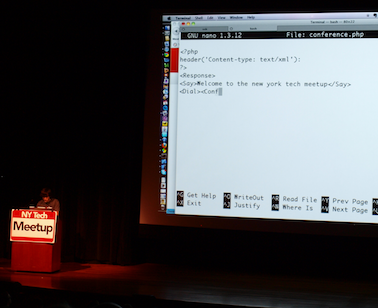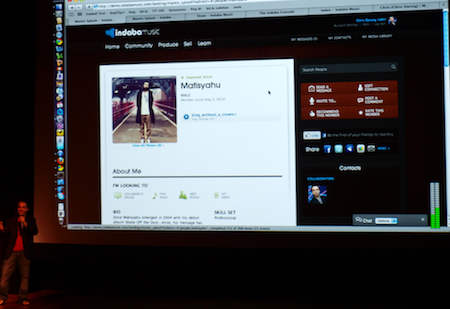My ears are still ringing from a rant by Sam Lessin, Drop.io founder, as he went about trying to disprove intrinsic altruism and trust, and reclaim the commanding heights with neo-classical economics. More on this later, but it is a curious position for a tech entrepreneur whose site is based on people uploading and sharing content for a cost of bupkis.
A few of the high points for me at last night’s New York Tech Meetup: TurnTo, which lets online shoppers find out what friends have purchased; Twilio (which I’ve written about before) had a nice telephony demo for this data-centric audience, and Indaba is a great site for helping musicians monetize their craft.
Oh, and there was a startup, I think called Microsoft, showing off their Bink, or maybe it’s Bing(?) search engine. And Willow Garage, a robotics startup, gave us a glimpse into a future where we stay at home and let our mechanical avatars roam the corridors and aisles of faraway office suites.
I am a Shirky-ite, and in complete harmony with his ideas on social capital and television watching (some of which really originated with Robert “Bowling Alone” Putnam).
Contra Sam Lessin: I think that we have an endowment of core altruism, from which we no doubt have gained evolutionary benefits. There are some studies (see the reference at the end) indicating that this endowment correlates with how kind we are to friends, from which do expect something in return. We’re kind to friends because in part we’re also inherently kind to strangers.
And no, everything is not “fungible” or exchangeable—it’s a concept that economists like because then you have nice, smooth utility equations with all the usual partial derivatives, blah-blah, optimization, blah.
Look, there’s no price that anyone can put on a hike I went on last Friday in the Hudson Valley. My exchange rate for that is infinity!
TurnTo

TurnTo brings up recommendations from Facebook friends.
This leads nicely to TurnTo, a social buying platform that lets you find out what your Facebook friends have purchased or recommended. You trust your friends and friends of friends, and your social network trusts you. TurnTo let you tap into this social capital through a widget supplied to e-retailers.
I tried one of the online stores in which TurnTo had been embedded; and after an fbConnect, TurnTo searched through its database to match purchases on the site with my contact list. None came up for me, but I did notice that I was still receiving Amazon-style reviews and recommendations. No worries about privacy since TurnTo is completely opt-in, and allows for anonymous suggestions and comments. Thank the supreme being for kind strangers and altruism!
This is a great service for those sites that have not already invested in a back-end part to handle reviews and recommendations: TurnTo will perform this function for them.
FYI: TurnTo charges a flat fee to retailers for their service.
Twilio
I think we were all impressed that at Twilio’s demo, John Britton could crank out some HTML and TwiML—their VoiceXML-ish markup— to create a simple hello-world voice browser page. And kudos for showing that Twilio lets you dynamically create a voice number that was instantly available to the Skirball crowd for on-the-fly calling. Those of us from the pre-dot com era remember when phone number provisioning was not a real-time process.

Twilio’s John Britton bravely coding telecom in front of 800 NYTM-ers.
And he topped it off by hacking out some PHP code that used Twilio web service function to call back cell phones from a list of stored caller ids. There was a spontaneous mashup of ringtones as Twilio’s back-end telephony server made the connections. The crowd was pleased.
I held my breath at a few points, but it all worked without a hiccup.
My own experience with Twilio web services has been completely positive, and I’m sure the NYC tech community will find applications of Twilio’s utilitarian telecom toolkit.
Indaba
Indaba (Zulu word meaning collaboration) is a stealthy startup that is creating an on-line community of musicians. More than just a social network—there’s all the usual forums and chat mechanisms—Indaba has also given musicians the tools to produce and market their songs.

Chris Danzig works with Matisyahu.
Indaba makes it astonishingly easy for song makers to collaborate remotely. The show stopper was the in-browser digital audio workstation that lets you lay down tracks or choose from their extensive library (over 10,000 samples including Matisyahu, Yo Yo Ma, and John Legend).
Indaba is a virtual production studio, record label, and retail store all rolled into one.
Simply amazing.
Microsoft
So Microsoft came by to tell us about some new features for Bing. First the small stuff. There were some neat extras they’ve added to the Safari browser to let you do one-click map look-ups on addresses and handle automatic translation of text to boot. You’ll need the Bing Highlights plug-in from the Extension Gallery to pull this off.
The larger theme has to do with Microsoft’s initial exploration of the semantic web. The presenter, Bing product manager Reed Shaffner, was particularly proud of the fact that Bing can identify rock lyrics and then pull up videos, related songs, and of course, the full text of the lyrics. Bing also is pretty adept at identifying TV shows and gathering all kinds of groovy content, including past episodes. (Clay Shirky and I hate this idea, Sam Lessin loves it, no doubt.)
While I think Google is ahead in its semantic web journey, especially with its recent purchase of MetaWeb, I am (gasp) rooting for Microsoft to give Google a good race for their money.
That’s about it from me. Let me give a shoutout to Willow Garage for their Texai roving video robots, which have added a new meaning to telepresence—it’s a bit like having your own Mars Explorer for the office.
Related articles by Zemanta
- Directed Altruism and Forced Reciprocity in Social Networks
- What You Missed At Last Night’s New York Tech Meetup (businessinsider.com)
- A Little VoiceXML Courtesy of Twilio (technoverseblog.com)
- Freebase: Semantic Sandwich for Google (technoverseblog.com)
- Twilio
- TurnTo
- Indaba
- Willow Garage



Thanks for the write-up. We’ve got a few of the stores using TurnTo already converted over to the new 2.0 product that we demo’d on Tuesday. (The one you checked out is still on v.1.) To see the new version, try http://www.accessorygeeks.com, http://www.clubfurniture.com. or http://www.sportsfanfare.com. Or if you live in the ‘burbs, http://www.sprinklerwarehouse.com.